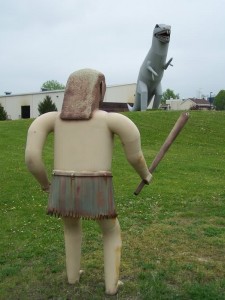Some things never change. And sometimes the things that never change still somehow change for the worse. This post originally ran on January 5, 2011—an anti-science era that now seems almost quaint. Those were the days!
I blame David Letterman. Less than a month before the 2000 U.S. Presidential election, one of the guests on his show was the governor of Texas, George W. Bush. After the usual banter, Letterman got down to business: the death penalty (2:51 in the clip above). “Did they ever determine whether or not it deterred crime?” Letterman said. “Is it a deterrent?”
“I think that’s a hard statistic to prove,” Bush answered. “If I could be convinced it didn’t deter crime, I may change my opinion about the death penalty.”
“But Governor,” Letterman didn’t say, “everybody knows you can’t prove a negative.”
Actually, everybody doesn’t know that. Maybe Letterman did know it, but didn’t think fast enough to say it. Certainly Bush didn’t know it, and he continued not to know it. And the consequences of that ignorance will be taking their oaths of office today, as the 112th United States Congress convenes.
 The claim that the death penalty deters crime: Can you prove it? Yes, by presenting an instance where the threat of lethal injection or firing squad or the electric chair persuaded somebody not to commit a murder. But can you prove it doesn’t deter crime? No, because no matter how many examples you present of murderers not persuaded not to commit murder—which is to say, every murderer out there—the death penalty advocate can always respond, Just you wait. One day you’ll find that person.
The claim that the death penalty deters crime: Can you prove it? Yes, by presenting an instance where the threat of lethal injection or firing squad or the electric chair persuaded somebody not to commit a murder. But can you prove it doesn’t deter crime? No, because no matter how many examples you present of murderers not persuaded not to commit murder—which is to say, every murderer out there—the death penalty advocate can always respond, Just you wait. One day you’ll find that person.
Or what about weapons of mass destruction in Iraq: Can you prove they exist? Sure, by finding weapons of mass destruction in Iraq. But can you prove they don’t exist? No, because no matter how long you inspect the countryside and come up empty, someone can always respond that you haven’t looked hard enough. Just you wait—one day you’ll find them.
How about the hope that history will vindicate your decisions during your two terms as president: Can you prove it? Absolutely, the moment history does just that. And if history doesn’t? So what? Just you wait, and, if necessary, wait and wait and wait and wait—because history isn’t over yet.
And therefore, in each of these instances (and in many, many others), an underlying assumption winds up depending on the validation of an untestable prediction. The validation, which can’t come, doesn’t come. You could wait forever, or you could act now. So why wait?
The weak grasp of logic extends beyond asking opponents to do the impossible by proving a negative. It pollutes the whole question of what constitutes “proof,” and therefore what’s a theory. If you can’t “prove” the Big Bang theory, then isn’t an alternative theory just as valid? Well, no—unless that alternative theory makes the kind of predictions that the Big Bang theory does, predictions that scientists can go out and subject to tests, tests that other scientists can duplicate. Duplicate enough tests on enough predictions of enough phenomena, and after a while you have a theory that, although subject to revision and even, eventually, contradiction, is solid enough to use as the basis for further investigations.
This past decade we’ve seen what happens when there’s widespread confusion about what’s a theory and what’s wishful thinking. You get Intelligent Design, an Earth that’s 6,000 years old, and the widespread suspicion that the science behind global warming is bunk. You get supposedly independent government researchers being instructed to ignore inconvenient evidence, or change it, or at the very least shut up about it. You get an outright dismissal of people who believe in the power of facts—those of us who, as a “senior advisor to Bush” told journalist Ron Suskind in a New York Times Magazine article in 2004, constitute “what we call the reality-based community.”
“I nodded and murmured something about enlightenment principles and empiricism,” Suskind wrote. “He cut me off. ‘That’s not the way the world really works anymore,’ he continued. ‘We’re an empire now, and when we act, we create our own reality. And while you’re studying that reality—judiciously, as you will—we’ll act again, creating other new realities, which you can study too, and that’s how things will sort out. We’re history’s actors . . . and you, all of you, will be left to just study what we do.’”
Enlightenment principles and empiricism: not the way the world really works anymore.
According to a post-election ThinkProgress analysis of the incoming Congress this past fall, 35 of the 46 Republicans in the Sentate and 125 of the 240 Republicans in the House question global warming. The report went on to quote from, or summarize the attitudes of, each of those members of Congress. Among words like “hoax” and “scam” and “chicken-little scheme,” you’ll find plenty of calls for “real” scientific evidence.
 “In my state of Texas,” Bush told Letterman, “we’ve got lawyers lookin’ at every single case” on death row. “People got full access to the courts. And I believe that every person been put to death has been guilty of the crime charged and has had full access to the courts of law both at the state and federal level.” This past November, a DNA analysis of evidence from the scene of a 1989 murder in East Texas showed that the supposedly incriminating hair belonged to the victim, not the man who, protesting his innocence, died by lethal injection on December 7, 2000—two months after the Letterman interview, one month after the election, and 14 days before George W. Bush vacated the governor’s mansion.
“In my state of Texas,” Bush told Letterman, “we’ve got lawyers lookin’ at every single case” on death row. “People got full access to the courts. And I believe that every person been put to death has been guilty of the crime charged and has had full access to the courts of law both at the state and federal level.” This past November, a DNA analysis of evidence from the scene of a 1989 murder in East Texas showed that the supposedly incriminating hair belonged to the victim, not the man who, protesting his innocence, died by lethal injection on December 7, 2000—two months after the Letterman interview, one month after the election, and 14 days before George W. Bush vacated the governor’s mansion.
I don’t really blame David Letterman. Not everyone needs to understand how the scientific method works—even late-night talk show hosts (though you can imagine what Jon Stewart would have made of Bush’s “argument”). Even if Letterman had said to Bush what I wish he’d said, I doubt that Bush would have slapped his forehead and declared he’d never thought about logic that way.
And an anti-science bias has been a part of this country since its beginnings, although, as Timothy Ferris argues inThe Science of Liberty: Democracy, Reason, and the Laws of Nature, the Founding Fathers did base their interpretation of democracy on the scientific method. This fact might give Tea Partiers pause, if facts mattered to them more than wishful thinking.
Still, today, in honor of the opening of the 112th Congress, I’d like to engage in a little wishful thinking of my own—the belief that one day scientific ignoramuses won’t occupy seats of power and impose their own illogical and untestable hopes on everyone else. I have a theory that that day will come. Can I prove it? Yes, when that day comes. Just you wait.
And wait. And wait. And wait. And wait.
* * *
Graphics credits (top to bottom): YouTube; agentgenius.com; theweirdusmessageboard.yuku.com; Juan de Vojníkov.

Nice post, though I wonder if you’re selling the Republicans short a little in some areas (hard to believe, I know, but bear with me). Yes, many Republicans are deniers of global warming, but I think it has a lot more to do with the position being politically favorable rather than something they actually believe. There have been a number of Republicans (Chairman Upton and Newt Gingrich among them ) used to be for the idea of cap and trade and other environmentally-friendly ideas before they became politically toxic to their constituents (i.e. business). So like good sheep, they immediately switched their positions once they were told to by the big business interests that run their party.
To be honest, this sort of ossification has always been impressive to me. One of the strengths of the Republican party has always been to latch onto an idea en mass and run with it. Never mind whether there’s any truth to the idea, as long as it can be summed up in five simple words or less it’s a good one. Take “Death Panels.” There’s not a shred of evidence to support their existence, but to explain that there’s no such thing takes way to long for the attention span of just the voter the concept was designed to affect. One consequence of this sort of approach is pretty much incompatible with good science, where nuance and caveats abound.